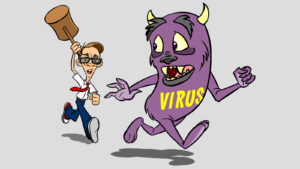
Virus Removal, What To Look For
A virus is a malicious type of software. It’s usually made up a small piece of code which attaches itself to harmless software. Whenever the harmless software is run, the virus runs too. Usually (though not always) the purpose of the virus is to expand itself throughout your computer, often damaging data in the process.
In this article, we’re going to give you a quick virus removal overview: how seriously you should take them, how they spread and what you can do to deal with them.
Are you worried that digital nasties are living on your computer? Nerds On Call can give you complete peace of mind with our virus removal and protection service. We’ll perform a thorough scan for any malicious software on your computer and we’ll set you up with software to keep you protected. You can speak directly with one of our friendly nerds on 1-800-919-6373 or you can drop us a note through our contact form.
Virus Removal: Here’s The Bad News…
So let’s start with the bad news about viruses. They are extremely common. Up to forty percent of US household computers are affected by viruses. This is partly because they’ve been around a long time and it’s also something to do with the fact they are specifically designed to spread far and wide.
So, we hate to break it to you but the chances are very good that you have or will be exposed to a virus at some point in your computing life.
Then there’s the good news…
The good news is that virus protection software has been around for a long time. These days, it’s easy to protect your system from viruses with the right tools (more on that in a moment). In fact, it’s one of the less painful computing challenges once you know what to do.
Unlike some of the more nasty kinds of malware out there, most viruses cause little immediate damage. Viruses are ‘dumb’, in the sense that for the most part all they do is multiply through your system. They aren’t designed to achieve specific malicious goals in the way that adware or spyware does. However, many viruses can still cause data loss.
If you do have a computer virus, the best thing to do is treat it like you might treat a head cold. It’s nothing to panic about but it’s not smart to take it for granted either! You’ll want to get rid of these digital nasties as soon as possible. Thus, the need for expert virus removal service.
If you’d like a Nerd to show you the ropes in how to harden your computer against viruses, we’d be delighted to help you out. Contact us at 1-800-919-6373 or reach us through our contact form.

Virus Removal: How Does A Virus Get On To My Computer?
Before we get to the virus removal services, let learn how they get there. One of the biggest questions we get is, how did this thing get on my computer in the first place? Ever seen one of those corny horror movies in which the evil vampire guy can only enter the victim’s home if they invite them in? As odd as it may seem, viruses are like that vampire. They typically get into your computer because at some point you’ve let them in. Here are a few typical ways you may accidentally invite a virus to set up shop in your hard drive.
Hyperlinks and attachments in emails can contain viruses. When you click on a malicious link or attachment you’re giving the virus its opportunity to install itself to your system.
The tricky part is that the people sending out these emails are often really good at making the email seem legitimate. The email may look like it comes from your bank, a shipping company or any other honest business. It’s very easy to be duped if you’re not paying attention.
If you receive an email like this, our advice is that you always look carefully before clicking. Does the email address originate from the company, or is it something generic like Gmail? Does the wording in the email seem odd? Do you just feel suspicious?
If in doubt we advise that you call the company directly to check. You can always drop us a line too if you want a second opinion.
Websites
Websites can contain links that install viruses on your computer. This may be in the form of free software or it could even be something as innocent-looking as an online advertisement.
Before you click on anything online, it’s a good idea to ask yourself if anything seems suspicious or odd. If a message pops up requesting permission to install a plugin or any other software whose purpose and origin you don’t completely understand, the best thing to do is click ‘no’.
Social media
People tend to relax while they’re browsing their favorite social platform, which makes them a lot more likely to click without thinking. Virus coders have been quick to exploit this and a steady stream of viruses are now flooding social media channels.
Don’t be fooled! If a link on Facebook, Twitter or any similar service asks you to download software or plugins, approach with extreme caution.

Virus Removal: How Do I Deal With A Computer Virus?
Luckily, most viruses can be dealt with pretty handily with the right anti-malware tools. We recommend that every computer in your house should have software set up to provide continuous protection against virus and other malware infections.
Here is a software packages we recommend:
- Webroot: Works on Windows PC and Mac. Scans your computer for nasties and destroys them quick smart. Offers continual protection against viruses and other known malware threats.
Not only do we recommend this software packages we’ll also install and configure them for you. If you’re unfamiliar with software installation, we’d be delighted to help you out. Contact us at 1-800-919-6373 or reach us through our contact form.
When Does A Simple Virus Problem Become More Serious?
Yes, viruses aren’t usually a huge problem. They can be though, under certain conditions. If any of the following are happening on your computer, your virus problem may have reached the point where you may need a nerd’s help. You will need an expert tech for virus removal.
If the virus comes back
Let’s say you’ve performed a system scan with anti-malware software and it detected and removed a virus. A week or so later you ran the scan again and you discover that same virus still lurking on your computer. If a virus is beating your software defenses our advice is that you holler for a nerd.
You’re beginning to see data loss or damage
If you start to see files mysteriously becoming corrupt or disappearing, this is no longer a harmless virus inhabiting your computer. While operating systems can be replaced, data loss can be unrecoverable. Again, this may be a moment in which a nerd’s help might be a smart idea.
Your computer seems ‘sick’
If your computer starts to slow down while doing simple tasks or if it takes forever to boot up, this could be a sign that your computer is extensively infected with viruses. Just like you would with data loss, our suggestion is that you get in touch with trained professionals who can diagnose the problem and completely remove any malicious software from your system.
Computer Virus Removal
If a virus problem is spoiling your day, Nerds On Call is here to make the problem go away. We’re fast, reliable and friendly when it comes to virus removal. Contact us at 1-800-919-6373 or reach us through our contact form for virus removal.
While computers usually look after themselves, occasionally things go wrong. When this happens, you might need a Nerd to run a complete diagnostic. If you’d like to learn more about our complete (and free) diagnostic service, click here.


